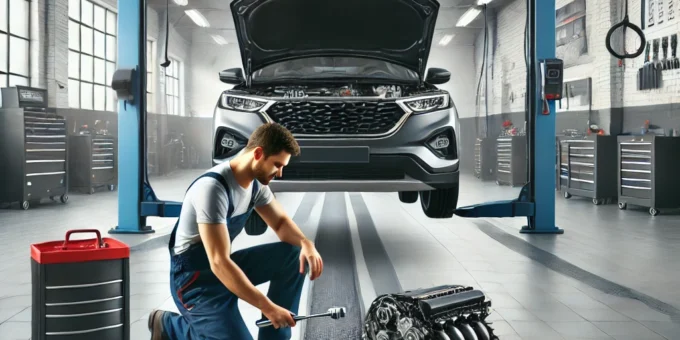
Why Complete Car Care is Essential for Your Vehicle
Owning a car comes with responsibilities, and regular maintenance is key to keeping your vehicle running efficiently. A well-maintained car is safer, more fuel-efficient, and less likely to experience costly breakdowns. Essential car care services like oil changes, tire rotations, and engine tune-ups ensure longevity and reliability.
Neglecting routine maintenance can lead to major mechanical failures, reduced fuel efficiency, and unsafe driving conditions. With proper servicing, you can avoid expensive repairs and enjoy a smoother driving experience.
The Importance of Regular Oil Changes
Motor oil is the lifeblood of your engine, reducing friction, cooling components, and preventing sludge buildup. Over time, oil degrades and loses its effectiveness, making regular oil changes essential.
Benefits of Routine Oil Changes:
✔ Improves Engine Efficiency: Fresh oil reduces friction and keeps engine components running smoothly.
✔ Prevents Engine Wear: Clean oil protects against premature engine wear and tear.
✔ Enhances Fuel Economy: A well-lubricated engine operates more efficiently, using less fuel.
✔ Extends Engine Life: Regular oil changes help prevent costly engine breakdowns.
How Often Should You Change Your Oil?
- Conventional Oil: Every 3,000–5,000 miles
- Synthetic Blend Oil: Every 5,000–7,500 miles
- Full Synthetic Oil: Every 7,500–10,000 miles
Always check your vehicle’s manual for manufacturer recommendations.
Tire Rotation: Extending Tire Life & Enhancing Safety
Tires are your vehicle’s only contact with the road, and keeping them in top condition is crucial. Uneven tire wear can affect handling, fuel economy, and overall safety.
Why Tire Rotation is Necessary:
✔ Even Wear & Longer Lifespan: Prevents excessive wear on specific tires, extending their usability.
✔ Better Traction & Handling: Ensures even tread depth for improved grip, especially in wet conditions.
✔ Improves Fuel Efficiency: Balanced tires reduce rolling resistance, helping you save on fuel.
✔ Prevents Suspension Damage: Uneven tires can put extra stress on your suspension and alignment.
When Should You Rotate Your Tires?
Most experts recommend rotating your tires every 5,000–7,500 miles or with every oil change. Regular tire rotation maximizes performance and keeps you safe on the road.
Engine Tune-Ups: Keeping Your Vehicle Performing at Its Best
A properly tuned engine ensures optimal performance, fuel efficiency, and reduced emissions. Over time, spark plugs wear out, filters get clogged, and sensors may fail—leading to poor engine performance.
Signs Your Car Needs an Engine Tune-Up:
✔ Rough Idling or Stalling: Indicates issues with spark plugs or fuel injectors.
✔ Decreased Fuel Efficiency: Dirty air filters and faulty sensors can lower gas mileage.
✔ Sluggish Acceleration: A poorly tuned engine lacks power.
✔ Illuminated Check Engine Light: May indicate problems with sensors, ignition coils, or fuel systems.
Key Engine Tune-Up Services:
- Replacing Spark Plugs: Ensures proper ignition and efficient fuel combustion.
- Inspecting & Replacing Air Filters: Clean air filters improve engine performance and fuel economy.
- Checking Fuel System: Clean fuel injectors and filters enhance combustion.
- Testing Sensors & Ignition System: Faulty components can cause misfires and reduced efficiency.
Most vehicles benefit from a tune-up every 30,000–50,000 miles for optimal performance.
The Cost of Neglecting Regular Maintenance
Skipping essential services like oil changes, tire rotations, and tune-ups can lead to costly repairs. Here’s what happens when maintenance is ignored:
| Service | Neglect Consequences | Potential Repair Cost |
|---|---|---|
| Oil Change | Engine sludge buildup, overheating | $3,000–$7,000 (Engine Replacement) |
| Tire Rotation | Uneven wear, blowouts, poor handling | $500–$1,200 (New Tires) |
| Engine Tune-Up | Misfires, poor fuel economy, power loss | $1,000–$3,500 (Major Engine Repairs) |
Regular maintenance helps you avoid unnecessary expenses and extend the life of your vehicle.
DIY Car Maintenance: What You Can Do at Home
While professional servicing is essential, some maintenance tasks can be done at home:
- Check Oil Levels: Use the dipstick to monitor oil levels between oil changes.
- Inspect Tire Pressure: Keep tires inflated to recommended PSI for better mileage.
- Replace Air Filters: A quick and easy job that improves fuel efficiency.
- Monitor Fluid Levels: Regularly check coolant, brake fluid, and transmission fluid.
- Listen for Unusual Noises: Catching minor issues early can prevent major repairs.
If you’re unsure about any maintenance task, consult a professional to avoid costly mistakes.